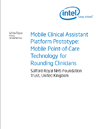 Salford Royal NHS Foundation Trust, United Kingdom
Salford Royal NHS Foundation Trust, United KingdomA wide range of clinical support healthcare professionals (allied health professionals) conduct rounds in a hospital, including physicians, physical therapists, ward nurses, dieticians, and phlebotomists. These rounding "clinicians" often have far more restricted access to healthcare information technology than a hospital's resident staff.
Intel's Digital Health Group conducted an ethnographic field study at Salford Royal NHS Foundation trust, located in Greater Manchester, U.K., to tray and improve the effectiveness of mobile point-of-care (MPOC) solutions for these clinical support healthcare professionals.
The improved workflow produced some interesting results.
Download Mobile Clinical Assistant Platform Prototype: Mobile Point-of-Care Technology for Rounding Clinicians White Paper (.pdf, 302 KB).
Download from the eHealthNews.EU Portal's mirror: Mobile Clinical Assistant Platform Prototype: Mobile Point-of-Care Technology for Rounding Clinicians White Paper (.pdf, 302 KB).
Related news articles:
- Intel in Healthcare Profile